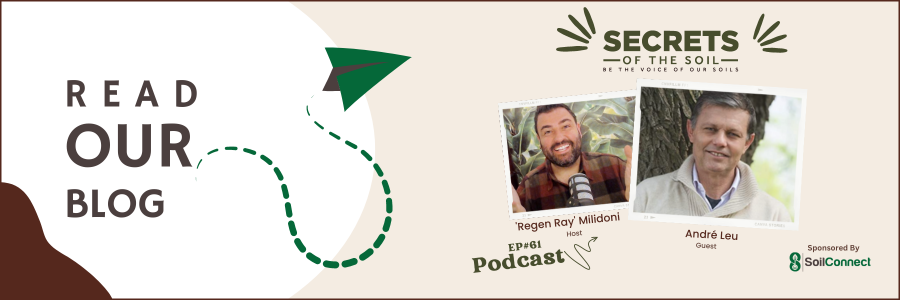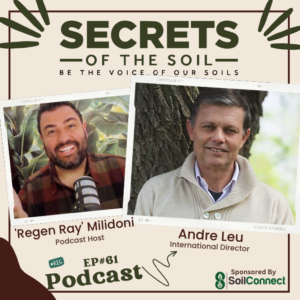🌱 Unlocking the Secrets of Soil with Regenerative Agriculture 🌱
I had the incredible opportunity to listen to Episode 61 of the “Secrets of the Soil” podcast, hosted by Regen Ray Milidoni, featuring the esteemed Andre Leu. The episode delved deeply into the transformative power of photosynthesis, soil regeneration, and how we can foster more sustainable agricultural practices.
Andre Leu shared invaluable insights from his years of experience, highlighting the importance of fostering a healthy relationship between plants, soil, and ecosystems.
Here are three key takeaways from this enlightening discussion:
🔹 The Synergy of Nature: Regenerative agriculture works in harmony with nature, promoting a synergy that boosts both plant health and soil quality. Andre Leu emphasized how cover crops and fungi play pivotal roles in providing essential nutrients and increasing crop yield without costing extra money.
🔹 Tackling Climate Change: Through peer-reviewed scientific research, Leu discussed the significant benefits of regenerative agriculture in mitigating climate change. By focusing on just 10% of farmable land, we can reverse negative environmental impacts and restore the climate.
🔹 Emerging Leaders in Agriculture: Excitingly, young people with advanced degrees are showing a growing interest in regenerative practices. Organizations like Regeneration International are mentoring these young leaders to spearhead the future of agriculture.
Andre also introduced us to his new book “Growing Life,” a must-read for anyone passionate about regenerative organic agriculture. Let’s take steps together towards a more sustainable and thriving agricultural future. 🌍🌱
Who is Andre Leu?
Dr. André Leu is the International Director of Regeneration International, an organization that promotes food, farming, and land-use systems that regenerate and stabilize climate systems, the health of the planet, and people. Regeneration International has over 400 partners in 70 countries and works with numerous agricultural systems such as agroecology, organic, permaculture, ecological agriculture, holistic grazing, biological agriculture, organic agriculture, and agroforestry.
André is an expert in these fields, having spent over 50 years as an organic farmer specializing in tropical fruits. He has also spent more than 45 years working and visiting countries in the development of new crop systems across Asia, Europe, North American, South America, and Africa. Andre has published three books entitled ‘Growing Life,’ ‘Poisoning our Children’ and the ‘Myths of Safe Pesticides,’ He has published extensively in magazines, newspapers, journals, conference proceedings, newsletters, and websites and numerous media interviews for TV, radio, and online systems.
André was the longest-serving President of IFOAM – Organics International, the world change agent and umbrella body for the organic sector. IFOAM – Organics International. He is currently an IFOAM Ambassador. He lectures and teaches at universities, institutions, and workshops worldwide. He speaks at conferences, seminars, workshops, and United Nations events on every continent. He meets with governments, United Nations bodies, industry, farmers, consumers, and NGOs on the multi-functional benefits of regenerative agriculture and the science of increasing soil organic matter to mitigate and adapt to climate change.
Qualifications: Doctorate of Science, Faculty of Agricultural and Natural Resources, Rajamangala University of Technology, Chonburi, Thailand, 2022 Graduate Diploma in Adult Education, University of Technology Sydney, 1992 Bachelor of Arts Communications, with a Double Major in Social-Political Theory and Video Production, University of Technology Sydney, 1989 André and his wife Julia live on their organic tropical fruit farm in Daintree, Australia.

In episode 61 of the “Secrets of the Soil” podcast, host ‘Regen Ray’ Milidoni sits down with Andre Leu to delve into the transformative power of photosynthesis and regenerative agriculture. Leu, a seasoned advocate for organic farming and soil health, shares his wisdom on maximizing plant health, the role of cover crops, and the integration of ecosystems to combat climate change. This compelling conversation is ripe with actionable insights and underscores the importance of soil as the bedrock of all biotic life.
The Role of Photosynthesis in Soil Health
Photosynthesis, the process by which plants capture sunlight and convert it into energy, plays a pivotal role in building healthy soil. According to Andre Leu, maximizing photosynthesis is crucial for feeding the soil microbiome, the complex ecosystem of bacteria, fungi, and other microorganisms essential for nutrient recycling and plant health.
In his book “Growing Life,” Leu emphasizes that contemporary farming practices often neglect the 95% of biomass produced through photosynthesis. Properly managing this biomass can significantly improve soil health by increasing organic matter and fostering biodiversity. Cover crops, often viewed as competitors for resources, are redefined by Leu as valuable allies. By covering the soil, these crops reduce erosion, improve water retention, and provide organic material that nourishes the microbiome.
Regenerative Agriculture: A Synergistic Approach
In our discussion, Andre Leu underscores that regenerative agriculture is about more than sustainable practices; it’s about working harmoniously with nature to create synergistic relationships within ecosystems. This approach is far from new; it’s rooted in traditional farming methods but has evolved into a modern movement.
Leu offers compelling examples of how regenerative agriculture has yielded success in diverse climates, mentioning areas like Northern Australia and Zimbabwe. These stories demonstrate the universality of regenerative principles, which, though adaptable to specific environmental contexts, are fundamentally about enhancing soil health, increasing biodiversity, and improving the resilience of agricultural systems.
From Theory to Practice: Implementing Regenerative Techniques
One key takeaway from the conversation is the economic feasibility of regenerative techniques. Leu discusses how cover crops can be managed in a way that they feed cash crops, converting what is often seen as an expense into a revenue opportunity. By enriching the soil, cover crops can increase the yield and quality of subsequent cash crops, ultimately leading to higher profits for farmers.
Another crucial aspect is the symbiotic relationship between fungi and plants. Mycorrhizal fungi, for example, exchange essential nutrients with plants in return for glucose, derived from photosynthesis. This natural exchange benefits both the plant and the fungus, exemplifying the kind of mutually beneficial interactions that regenerative agriculture seeks to promote.
Addressing Climate Change through Regenerative Agriculture
Andre Leu is passionately committed to scaling up regenerative practices to mitigate and reverse climate change. He references a peer-reviewed scientific paper that highlights the benefits of regenerative agriculture in sequestering carbon and restoring ecosystems. Leu argues that focusing on transforming just 10% of farmable land can achieve significant environmental impacts.
To incentivize farmers, Leu introduces innovative schemes that involve paying polluting companies to compensate farmers for ecosystem services. This system could include carbon trading and carbon farming, with payments made based on measurable improvements in soil organic matter and biodiversity using scientific tools like drones.
The Path Forward: Cultivating Leaders and Building Trust
Leu also touches on the growing interest among young people in regenerative agriculture. Through organizations like Regeneration International, initiatives are underway to mentor these emerging leaders, ensuring they can build on the progress made by their predecessors.
However, the journey isn’t without its challenges. Both Leu and Milidoni express concerns about consumer confidence in sustainability certifications. The overuse and misuse of terms like “sustainable” and “organic” have led to widespread greenwashing, diminishing public trust. Leu advocates for organic certification as the most reliable standard, emphasizing the need for transparency and scientific validity in these measures.
Embracing the Regenerative Journey
In wrapping up the episode, both Andre Leu and ‘Regen Ray’ Milidoni encourage listeners to take proactive steps towards regenerative agriculture. This journey involves rethinking our relationship with the soil and adopting practices that not only sustain but actively regenerate our natural ecosystems. Whether you’re a farmer, a consumer, or an advocate, embracing these principles can contribute to a more resilient, healthy, and sustainable planet.
For more insights, resources, and to get involved in this transformative movement, listeners are encouraged to explore Andre Leu’s book “Growing Life” and join the Acres USA community. The next episode promises to build on these ideas, offering even more tools and tips for engaging with soil in meaningful ways.






